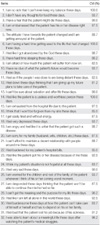Abstract
Purpose
The purpose of this study was to test the reliability and validity of an instrument to measure suffering of family of patients with terminal cancer.
Methods
This research was a methodological study processed as follows: 1) The preliminary 32 items were developed based a conceptual framework of suffering for patients with cancer. 2) The content was validated by an expert panel (n=24) and the family of patients with terminal cancers (n=33). 3) The instrument was validated by survey (n=92). Finally, 29 items were selected in developing final version of the scale.
Results
Seven factors were extracted through factor analysis: 'economical distress', 'loss of meaning in life', 'feeling of social isolation', 'emotional distress', 'burnout', 'guilty feeling', and 'physical discomfort'. These factors explained 66.94% of the total variance. Cronbach's alpha and Guttman Split-half coefficient of the 29 items were .93 and .92. respectively.
References
1. Kang KA. Concept analysis and development of suffering: application of hybrid model method. J Nurs Acad Soc. 1996. 26:290–303.

2. Korea National Statistical Office. Annual report on the cause of death statistics (Based on vital registration). 2008. Daejeon: Korea National Statistical Office.
3. Folkman S, Chesney MA, Christopher-Richards A. Stress and coping in caregiving partners of men with AIDS. Psychiatr Clin North Am. 1994. 17:35–53.

4. Nijboer C, Tempelaar R, Sanderman R, Triemstra M, Spruijt RJ, Ban den bos GA. Cancer and caregiving: the impact on the caregiver's health. Psychooncology. 1998. 7:3–13.

5. Goldstein NE, Concato J, Fried TR, Kasl SV, Johnson-Jurzeler RB. Factors associated with caregiver burden among caregivers of ill patients with cancer. J Palliat Care. 2004. 20:38–43.

6. Choi ES. Experiences of family caregivers with terminal cancer patients [dissertation]. 2006. Seoul: Seoul National Univ..
7. Oliviers D, Monroe B. Death, dying, and social differences. 2004. Oxford University Press.
8. Jung JG, Kim JS, Kim JS, Kim SS, Kang DS, Kim SM, et al. Quality of life among family caregivers of terminal cancer patient. Korean J Hosp Palliat Care. 2006. 9:1–10.
9. Emanuel EJ, Fairclough DL, Slutsman J, Emanuel LL. Understanding economic and other burdens of terminal illness: the experience of patients and their caregivers. Ann Int Med. 2000. 132:451–459.

10. Webb M. The good death. Seven: bearing the burden, Families in distress. 1997. New York: Bantam Book.
11. Kim HS, Yu SJ, Kwon SY, Park YH. Differences in patients and family caregivers' ratings of cancer pain. Korean J Hosp Palliat Care. 2008. 11:42–50.
12. Kim HC, Kim ES, Park KH. Needs of patients and their families in hospice care unit. Korean J Hosp Palliat Care. 2007. 10:137–144.
13. Kang KA, Kim SJ, Kim YS. The need for hospice care in families of patients with cancer. J Korean Community Nurs. 2004. 20:277–284.
14. Kang KA. Development of a tool to measure suffering in patients with cancer. J Korean Acad Nurs. 1999. 29:1365–1378.

15. Kang KA, Kim SJ. Development of needs assessment instrument for hospice care in families of the patients with cancer. J Korean Biol Nurs Sci. 2005. 7:57–68.
16. Lynn MR. Determinatin and quantification of content validity. Nurs Res. 1986. 35:382–385.
17. Lee EO, Lim NY, Park HA. Statistical analysis and nursing·medical research. 1998. Seoul: Soomoon Publishing Co.
18. Han SS, Lee SC, Ku JC. Health and medical statistical analysis. 2008. Seoul: Fornurse.
19. Kang BS, Serk KS, Oh YJ. SPSS/PC+ for statistical analysis. 1993. Seoul: Trade Management Press.
20. Kim SC, Jeoung DW, Son HR. Depression level among family caregivers of hospice patients. Korean J Fam Med. 2009. 30:175–181.

21. Ha JS, Yea SJ, Park SH, Kim I, Shin SS, Bae CY, et al. A study of the relationship between health risk factors and family function. J Korean Acad Fam Med. 1993. 14:647–652.
22. Andrews SC. Caregiver burden and symptom distress in people with cancer receiving hospice care. Oncol Nurs Forum. 2001. 28:1469–1474.
23. Murray SA, Kendall M, Boyd K, Grant L, Highet G, Sheikh A. Archetypal trajectories of social, psychological, and spiritual wellbeing and distress in family care givers of patients with lung cancer: secondary analysis of serial qualitative interviews. BMJ. 2010. 340:c2581.

24. Chan CW, Chang AM. Stress associated with tasks for family caregivers of patients with cancer in Hong Kong. Cancer Nurs. 1999. 22:260–265.

26. Han KH, Jung JG, Oh SK, Kim JS, Kim SS, Kim SY. Depression level among family caregivers of terminal cancer patients. J Korean Acad Fam Med. 2005. 26:752–758.
27. Meyers JL, Gray LN. The relationships between family primary caregiver characteristics and satisfaction with hospice care, quality of life, and burden. Oncol Nurs Forum. 2001. 28:73–82.




 PDF
PDF ePub
ePub Citation
Citation Print
Print








 XML Download
XML Download